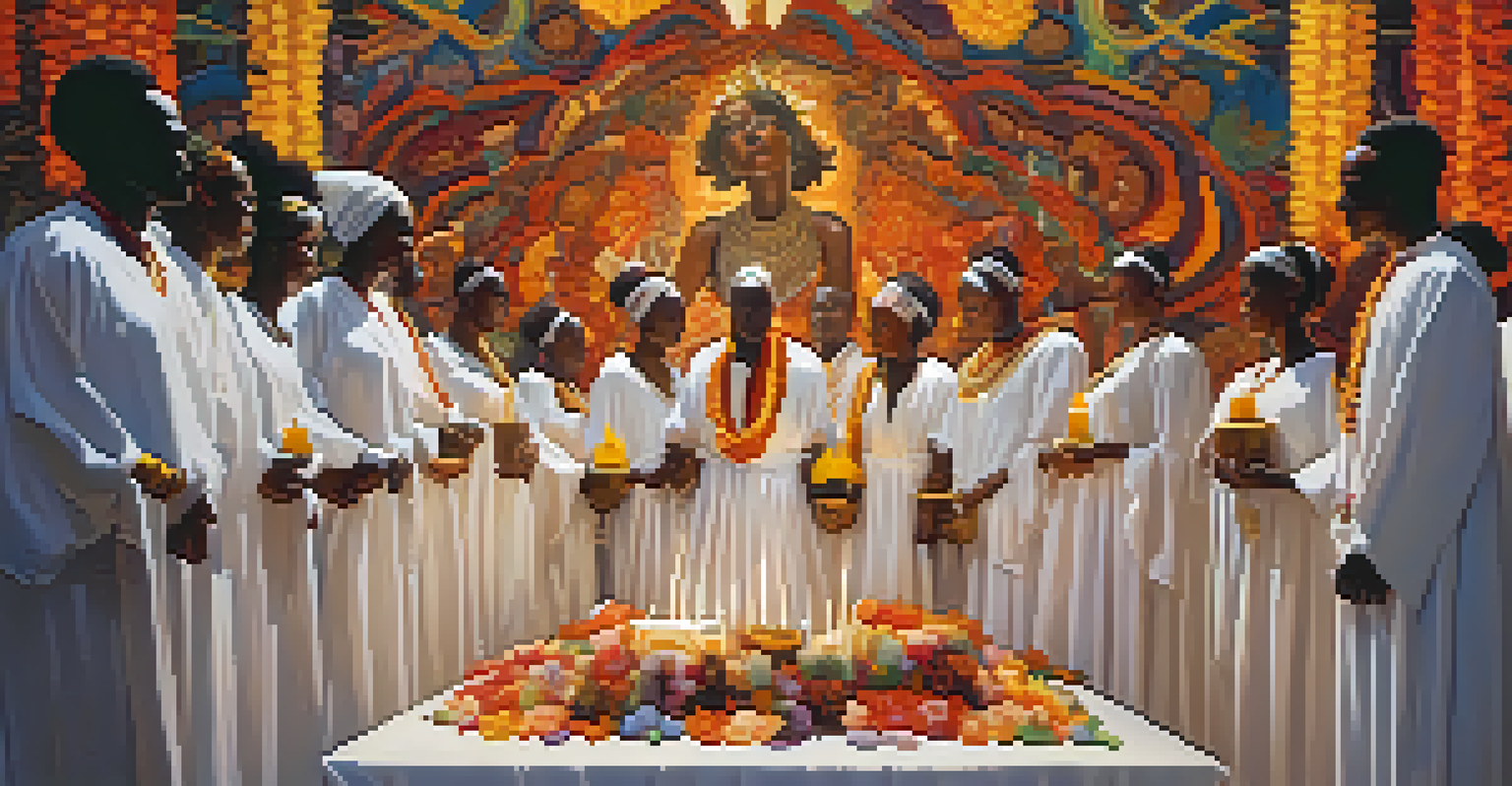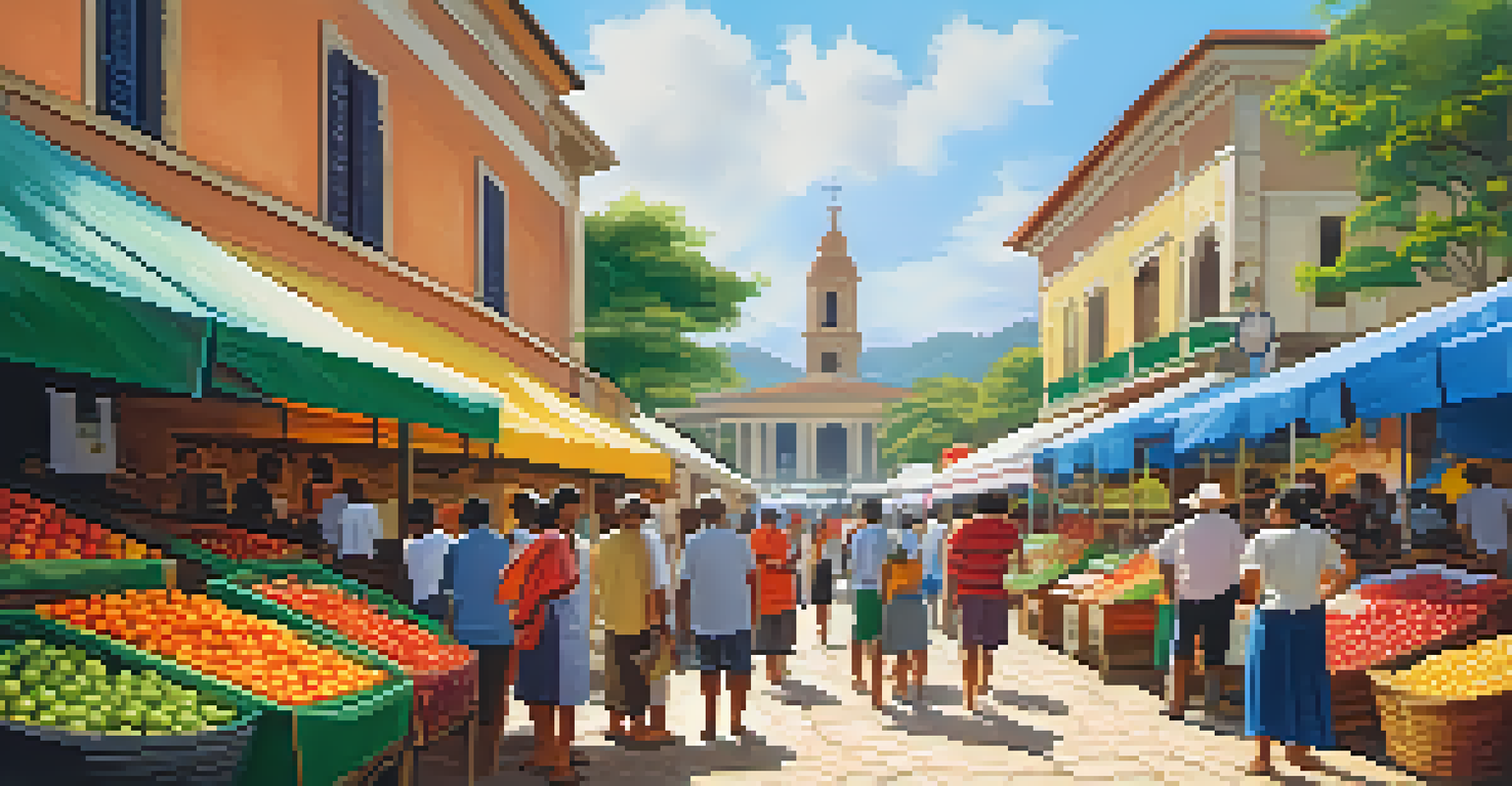Respecting Brazil's Diverse Cultures: A Tourist's Guide

Understanding Brazil's Cultural Mosaic
Brazil is often described as a melting pot of cultures, with influences from Indigenous peoples, Portuguese colonizers, African slaves, and various immigrant groups. This blend creates a vibrant cultural landscape that varies significantly from region to region. For instance, the rhythms of samba in Rio de Janeiro differ greatly from the haunting melodies of the Northeast's forró music.
Brazil is a country of contrasts and unique cultural diversity, which reflects its complex history and the resilience of its people.
Traveling through Brazil, you'll encounter diverse languages, festivals, and culinary traditions. Each state boasts its own unique identity, showcasing local customs that deserve appreciation and respect. As a tourist, immersing yourself in these distinct cultures can enhance your experience and create deeper connections with the people you meet.
To truly grasp Brazil's cultural mosaic, take the time to learn about the history and traditions that shape each region. Understanding these nuances not only enriches your travel experience but also shows respect for the people and their heritage.
Embracing Indigenous Cultures
Brazil is home to over 300 Indigenous tribes, each with its own languages, customs, and beliefs. These communities play a crucial role in preserving the country's biodiversity and cultural heritage. When visiting areas where Indigenous cultures thrive, it's important to approach with sensitivity and respect.

Engage with Indigenous communities in a way that honors their traditions. Consider participating in guided tours led by Indigenous people, which can provide authentic insights into their lifestyle and beliefs. For example, visiting the Yanomami tribe in the Amazon offers a unique perspective on their profound connection to the rainforest.
Celebrate Brazil's Cultural Diversity
Brazil's rich cultural mosaic, influenced by various groups, offers travelers unique experiences through music, festivals, and culinary traditions.
Remember, it's essential to seek permission before taking photographs or sharing stories about Indigenous practices. By doing so, you show respect for their autonomy and cultural significance, fostering a more meaningful exchange.
Respecting Afro-Brazilian Heritage
Afro-Brazilian culture is a cornerstone of Brazil's identity, influencing music, dance, and religion. Celebrations like Carnaval highlight this rich heritage, showcasing the vibrant rhythms and traditions that have been passed down through generations. Understanding the historical context of slavery in Brazil will deepen your appreciation for these cultural expressions.
The beauty of Brazil lies not just in its landscapes, but in the rich tapestry of its cultures and the vibrant spirit of its communities.
When attending Afro-Brazilian events, be mindful of the significance behind the celebrations. Participating in activities like capoeira or watching a candomblé ceremony can be enlightening, but it's crucial to do so respectfully and with the right mindset. Learn about the origins and meanings of these practices to engage authentically.
Moreover, supporting Afro-Brazilian artisans and businesses can further contribute to the preservation of their culture. By purchasing local crafts or enjoying traditional cuisine, you help sustain the community and its cultural heritage.
Navigating Regional Festivals with Respect
Brazil is famous for its lively festivals, each reflecting the unique character of its region. From the exuberance of the Rio Carnaval to the solemnity of the Festa Junina, these celebrations are rooted in local history and traditions. As a tourist, participating in these events can be a highlight of your trip, but it requires a respectful approach.
Before attending a festival, take time to learn about its origins and customs. Understanding the significance of rituals, dances, and costumes can enhance your appreciation and allow you to engage thoughtfully. For example, knowing that certain colors hold specific meanings can guide your attire choices.
Respect Indigenous and Afro-Brazilian Cultures
Engaging with Indigenous and Afro-Brazilian communities with sensitivity and respect enhances cultural exchange and appreciation.
Additionally, be conscious of your behavior during these festivities. Respect the space of performers and other attendees, and avoid disruptive actions. By honoring the traditions and values of the locals, you contribute to a more positive and enriching experience for everyone involved.
Exploring Culinary Traditions Mindfully
Brazil's culinary scene is a delicious reflection of its diverse cultures, with each region offering distinct flavors and dishes. From feijoada in the South to acarajé in the Northeast, there's a wealth of culinary experiences waiting for you. However, it's important to approach these traditions with respect and curiosity.
When dining out, consider learning about the origins of the dishes and the cultural significance behind them. Engaging with local chefs or food vendors can provide valuable insights into their cooking techniques and the history of the ingredients they use. This not only enhances your meal but also shows appreciation for their craft.
Moreover, be mindful of dietary restrictions and preferences when sharing meals. Asking about ingredients and respecting the local dining customs can elevate your experience and foster goodwill with the locals.
Learning the Language: A Sign of Respect
While many Brazilians speak English, especially in tourist areas, making an effort to learn some basic Portuguese phrases goes a long way in showing respect. Simple greetings, expressions of gratitude, and common questions can break the ice and create a more welcoming atmosphere. Plus, it often leads to warmer interactions with locals.
Even if your pronunciation isn't perfect, the attempt to communicate in their language is usually met with appreciation. Brazilians are known for their friendliness and willingness to help, so don’t hesitate to engage them in conversation. You'll find that most people love to share their culture and stories.
Practice Responsible Tourism
Being mindful of your impact on local environments and cultures is crucial for preserving Brazil's heritage and natural beauty.
Additionally, learning about Brazilian slang and colloquialisms can enhance your understanding of the culture. It can also help you connect with locals on a more personal level, making your travel experience even more enriching.
Being Mindful of Environmental and Cultural Preservation
As a tourist in Brazil, it's vital to be aware of the impact your visit can have on local environments and cultures. Many regions are facing challenges due to over-tourism, which can strain resources and disrupt local ways of life. Practicing responsible tourism is essential to help preserve Brazil's rich cultural heritage for future generations.
One way to do this is by choosing eco-friendly accommodations and supporting businesses that prioritize sustainability. Participating in environmental conservation programs or community-led tourism initiatives can also make a positive impact. For example, volunteering at wildlife sanctuaries or engaging in clean-up efforts can contribute to the preservation of Brazil's natural beauty.

Lastly, always leave places better than you found them. Whether it’s picking up litter or respecting sacred sites, these small actions can collectively lead to significant positive changes in the communities you visit.